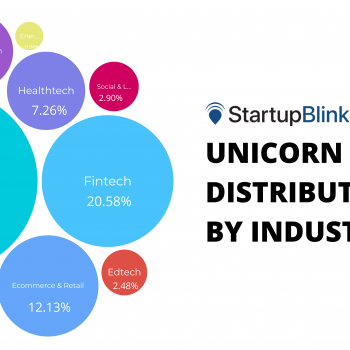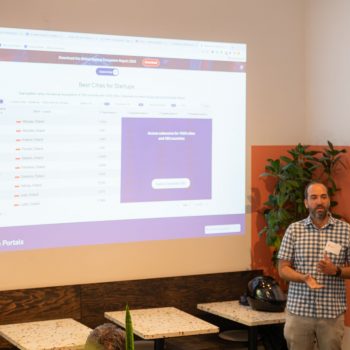Click here to view the Global Startup Organizations Map
Startup organisations address an important problem faced by entrepreneurs the world over, that of entrepreneurship being a lonely journey. Accelerators do fill in this gap to a certain extent, but what about startup founders struggling to figure out even their basic product, let alone monetisation strategy? This is where startup organisations step in, and offer support and guidance. And they do this in various ways, such as organising 54-hour startup events (Startup Weekend), or a week long celebration of local startups (Startup Week). They are boosting the coworking movement around the world (WeWork) and empowering entrepreneur to organise events through their platform (Meetup.com).
Here’s taking a detailed look at why startup organisations are spurring growth of startups like never before…
Startup Organisations – How do they help you and the startup ecosystem?
Validate your Ideas
This is the stage where most founders flounder. Startup events such as Startup Weekend, help founders step out of the Idea Castle and get real some real feedback on what their product and what it can be. Your idea may be fun to work on, but can it be developed into a product? You are seeing app downloads but will people actually pay when you decide to monetize? These are critical questions you can get answered by pitching and refining your ideas over time.
Network, Network, Network
Yes, you can’t get enough of it! No wonder LinkedIn has built a business around it. Networking is of course more than addings contacts to your phone book and by being an active member of startup organisations you can actually build relationships that go a long way. A good business network not only helps you sail through the challenges of hiring, fundraising, and establishing partnerships, but can also be a good support system.
Meet your Team
A good idea is just that, an idea. It’s execution that can take it places, and thus, the importance of a good team cannot be stressed enough. Startup organisations with their global networks, provide you opportunities to recruit top notch talent to scale your company. Attend a local tech meetup and you may meet your future CTO. Looking for a co-founder? You may just find one at the next startup event you go to!
Meet your Mentors
We’re all trying to figure it out. But what if you had someone all along to help you through the struggle? Someone who had been there, done that, and threw in some nuggets of wisdom each time you fumbled. Well, say hello to your mentor! Mentors are hard to find, but maybe not so much if you look harder. Being actively involved with a startup organisation gives you an opportunity to meet and greet potential mentors, and if you’re sincere enough, one of them may take you under his or her tutelage!
To ease the journey for startup ecosystem leaders, StartupBlink has designed a City Partnership program that aims to raise awareness of organizations that are leading local startup ecosystems and connect them with the key players, such as startup founders and public sector developers locally and globally. Our Network of partners includes Accelerators, Coworking spaces, Startup Organizations and Entrepreneurship Academies. The partnership is exclusive to one organization per city. Hence, your organization, among other benefits, is sure to receive acknowledgment as a local ecosystem leader and visibility in front of 75,000+ entrepreneurs and decision-makers on the StartupBlink Global Startup Map, as well as in our reports and communities.
As a City Partner, you are making a positive impact on the growth of your local startup ecosystem by activating it with a variety of powerful tools, as well as by supporting StartupBlink in our efforts to research, rank and promote your City. Ready to take your startup ecosystem to the next level, apply now here.
Major Startup Organisations in the World
With “entrepreneurship” becoming a buzzword, it’s not hard to find startup events and organisations in your city. But there are some that have established a global footprint and have impacted a large number of entrepreneurs. Here’s taking a look at the top 11 startup organisations in the world:
- Startup Weekend (@StartupWeekend)
What it does: You know the drill – Pitch your idea, form a team, work your product for 54 hours and present it on the last day! With this simple idea of “all action, no talk”, Startup Weekend has gone on to become a global phenomenon, with events in more than 150 countries! It’s important to note that the event is not for techies alone; it tries to maintain a balance between tech and business attendees, so teams can have a good mix of both.
What’s in it for you: Startup Weekend is much more than a hackathon event. For starters, it surprises you how much you can accomplish in a matter of three days armed with just an idea and intent. Moreover, it’s a great opportunity for you to network and meet potential co-founders and teams, investors and mentors. Many Startup Weekend teams have built their startups with the teams they formed at the event.
- Up Global (@techstars)
What it does: Up is a global organisation with a mission to support entrepreneurship through events, publications and communities. It is present in over 500 cities in the world. Its programs include Startup Weekend, Startup Next, Startup America, Startup Digest, Education Entrepreneurs and Entrepreneurs Across Borders. Up Global was recently acquired by TechStars, and while all its programs will be part of TechStars, they will continue to operate independently.
What’s in it for you: There are various ways in which entrepreneurs can engage with Up and leverage its vast network. If you are just starting out, you could volunteer with Up and meet like-minded people. If you are building the startup ecosystem in your local community, you can also share your story with Up’s blog, or organise your own Up event. As a startup founder, you can look to take back a wealth of knowledge and experience at Up’s various events.
- Google for Entrepreneurs (@GoogleForEntrep)
What it does: It has partnered with several programs and events that empower entrepreneurs, and is also building Google Campuses all over the world for entrepreneurs to connect and build their startups. Their network is spread across 125+ countries and some of their noted organisations that Google has partnered with or powered include Startup Weekend, Up Global, Startup Grind, The North American Tech Hub Network, #40Forward, and Manos Accelerator.
What’s in it for you: The three main focus areas for this organisation are Coworking spaces, or Campuses, partnerships with accelerators and other organisations that support entrepreneurs, and collaboration with startup communities.
Google Campuses are leading coworking spaces that regularly organise startup events and give startups a chance to interact with mentors and potential teams. Google also provides startups with additional resources such as financial and technical support.
- Startup Week (@startupweek)
What it does: It is a weeklong celebration of entrepreneurship in local communities and brings together the best entrepreneurs, leaders and startup enthusiasts. The event is held in a number of cities across the globe and each event organiser can select themes most relevant to his or her community.
What’s in it for you: Startup Week offers a great opportunity to connect with entrepreneurs and startup ambassadors in you local community. Having a support system in your local startup community can make more of a difference to your startup than you may think!
What it does: Google Developers’ program Launchpad, helps app developers with the tools and support needed to launch and scale their app. You can join the program at a nascent or growth stage and leverage Google’s expertise, technology and community.
What’s in it for you: It provides a great opportunity to app developers to gain valuable insights into building a successful app, distributing and monetizing it. In addition, it offers a whole lot of technical resources and tools that startups can take advantage of. All in all, Launchpad is ideal for programmers who wish to crack the code for building apps that people actually use and can be monetized.
- WeWork (@WeWork)
What it does: Leading the coworking movement around the world, WeWork provides shared office spaces to startups, freelancers and even big companies, in order to promote cooperation among entrepreneurs and talented professionals. As of now, it has offices in many parts of the world such as United States, United Kingdom, Israel and Netherlands.
What’s in it for you: Coworking spaces certainly have a lot to offer startups, and one with a wide presence such as WeWork, even more so. The most obvious perks include a place to interact with fellow startups and entrepreneurs and swap lessons learned, and access to basic amenities such as furniture, internet, prints and conference rooms. WeWork also offers additional networking opportunities through the various events it organises and demo days, along with free technical services from its various partners.
- Microsoft Ventures (@MSFTVentures)
What it does: While Google is leading the development of startup hubs around the world, Microsoft isn’t far behind. Microsoft offers different programs for startups, one of which is its startup accelerator, Microsoft Ventures. Programs range from 3-6 months and are currently located in various parts of the world such as Bangalore, Beijing, Berlin,London, Paris, Seattle, and Tel Aviv. Other programs by Microsoft include BizSpark, that offers free software, developer tools and other support to entrepreneurs, and Microsoft Innovation Centres, local hubs that offer training and mentorship.
What’s in it for you: If accepted into one of its programs, startups can take advantage of the technical support and tools that only a tech leader such as Microsoft can provide. Microsoft Innovation Hubs are also a good starting point to build your network and get expert advice on your startup. Currently, MICs are located in Bangkok, Brussels, Jordan and Malta.
What it does: While not exclusively a startup organisation, Meetup has quickly become a preferred platform for anyone who wishes to start a tech/startup event. The website has a page dedicated to Entrepreneurships meetups that include Stanford Entrepreneurs, NY Tech Meetups, Silicon Valley Founders and Startups, etc. It’s interesting to see some of the trends the website shows: Tech Meetups dominate all others in France, with the largest group being Growth hacking in Paris.
What’s in it for you: It doesn’t get easier than this if you want to interact and network with designers, coders, hackers, and entrepreneurs. Want to discuss your ideas with your peers? Having a hard time recruiting a technical co-founder? Simply attend a Meetup nearby or organise one on your own, and you may find what you’re looking for!
P.S.: We’re on Meetup too: StartupBlink Meetups 🙂
- The Founder Institute (@founding)
What it does: With a mission to “Globalize Silicon Valley”, The Founder Institute offers a four-month training program for entrepreneurs, with structured courses, feedback and assignments. The course is part-time. Currently, The Founder Institute has a network of 4400+ mentors across the world and has launched over 1500 companies over a span of 6.5 years.
What’s in it for you: A hands-on training program, based on Silicon Valley best practices, The Founder Institute gives you the opportunity to learn by doing, a critical aspect often ignored in most B-schools. The organisation has an interesting Shared Liquidity Pool approach, whereby equity in all companies created is shared by program mentors, graduates, local program directors and the Founder Institute. If you don’t want to join the program, you can always attend one of the many events it organises across the world.
What it does: The event that began in 2010 has quickly become one of the leaders in startup events. Powered by Google for Entrepreneurs, it is spread across 70 countries and 175 cities. Each month, it organises events for entrepreneurs to come and share their stories and lessons learned.
What’s in it for you: In its own words, Startup Grind is about “making friends, and not contacts”. Apart from attending its events, there are other ways for entrepreneurs to get involved. These include starting a Startup Grind Chapter in your own community, writing for its blog and suggesting speaker. These are great ways to take your involvement in your local startup ecosystem a notch higher and become a part of the organisation’s global community.
- Startup Digest (@StartupDigest)
What it does: Startup Digest is a curated list of events and startup news on topics ranging from angel investors, 3D printing, collaborative working, emerging economies, to specific regions such as China. Users can sign up to specific reading lists about which they will then receive curated newsletters. Lists are curated by local startup leaders who actively contribute to their startup community.
What’s in it for you: Apart from valuable news and advice in Startup Digest newsletters, you can also opt to become a curator yourself. You can also submit and attend various startup events, and become a member of the organisation’s global community.
12. City Partnership by StartupBlink
Conclusion
Startup organisations bridge the gap between ideation to launch, and sometimes even more. As new startups continue to mushroom each day, so will startup organisations. It’s important for all startups and entrepreneurs to help and promote those that are building meaningful communities.
Which are your favorite startup organisations? Let us know below!





